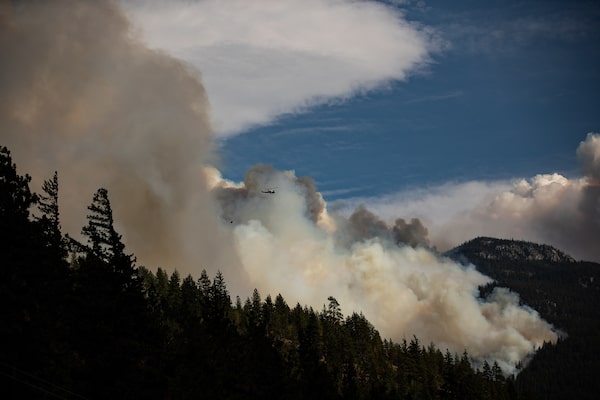
A helicopter carrying a water bucket flies past the Lytton Creek wildfire burning in the mountains near Lytton, B.C., on Aug. 15.DARRYL DYCK/The Canadian Press
Wildfire crews are facing fatigue in British Columbia as the busy season wears on, causing concern for their safety, says an operations manager.
Officials are seeing “more slips, trips, falls” and “other serious occurrences,” Todd Nessman, the BC Wildfire Service operations manager, told a news conference Thursday.
“It’s something that we take seriously and we want to monitor and make sure our staff are safe,” he said.
There are more than 3,800 firefighters from B.C. and more than 500 from out of province helping fight the wildfires.
Mr. Nessman called it a “hard” and “difficult” season with at least a month left to go and hot and dry weather conditions making things tougher.
“Is it any worse than previous seasons?” he said. “It all depends.”
The conditions this year are similar to those seen in 2017, he said.
The area burned over the 2017 wildfire season was more than 12,150 square kilometres, while it was more than 13,500 square kilometres the following year.
Data from the Ministry of Forests and Emergency Management BC show about 290 wildfires were burning in the province, and more than 8,500 square kilometres of land has been lost since the start of the fire season on April 1.
Mr. Nessman said officials are keeping an eye out for staff who need more help or additional time off.
“It is a personal level, too,” he said.
“Some people are built for this and some people – it’s more of a slog on them as well. But I will just say, it’s a trying season.”
While everyone is safe and there haven’t been any “significant” injuries or accidents due to fatigue, he said now is the time that officials have to address firefighters’ concerns.
“It’s been a long summer for many of our firefighters and staff supporting the efforts.”
Mr. Nessman said they would also be losing some crew members as soon as they head back to postsecondary institutions.
Recent weather in parts of B.C. has helped the firefighting efforts with cooler conditions and a chance of showers through Sunday. But temperatures are set to rise over much of southern B.C. next week, while the fire danger map shows the risk in the Kamloops fire centre has returned to moderate from low after last week’s rain.
Residents of a southern Interior community in British Columbia can return home after the lifting of an evacuation order a week after people were told to get out.
The District of Logan Lake lifted the evacuation order Thursday, while saying residents may have to leave again as the area is still at high risk with a “very” active wildfire nearby.
An evacuation alert was replaced by an “all clear” notice late Wednesday for more than 400 properties on the northwest flank of the roughly 811-square-kilometre White Rock Lake fire east of Kamloops.
On the northeast flank, the City of Armstrong has lifted an evacuation alert for about 5,000 residents, but other evacuation orders and alerts are still posted – including one along the northwest shores of Okanagan Lake, where flames destroyed more than 70 properties this week.
The province has more than 70 evacuation orders in effect. There are also more than 120 evacuation alerts, which means people should be prepared to leave on short notice.
Public Safety Minister Mike Farnworth said the B.C. government is sparing no expense when it comes to fighting wildfires.
The B.C. government earmarked $136-million for this year’s wildfire season, which is the same amount as 2020, a news release from the Ministry of Forests says.
Data from the BC Wildfire Service website show the government spent about $193-million last year to fight wildfires. But the 2017 wildfire season cost nearly $650-million and the government spent about $615-million in 2018, a news release says.
“We spend what we have to spend,” Mr. Farnworth said. “Money is not the issue.”
We have a weekly Western Canada newsletter written by our B.C. and Alberta bureau chiefs, providing a comprehensive package of the news you need to know about the region and its place in the issues facing Canada. Sign up today.
This content appears as provided to The Globe by the originating wire service. It has not been edited by Globe staff.